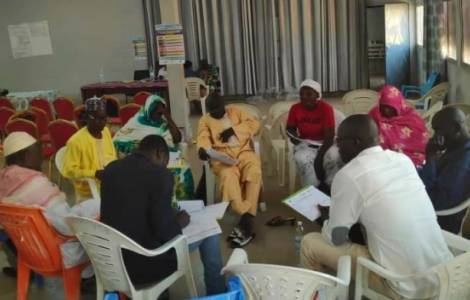
manosunidas
Bamenda (Agenzia Fides) - "At the beginning we had a body made up of the leaders of all the religions present in the Anglophone regions of Cameroon, created to find a solution to what we have always defined as a 'senseless war'. The coordination with Cardinal Tumi was very fraternal and the Anglophone General Conference (AGC) met regularly to discuss the reasons behind the conflict and find ways of peace. The work was done in good faith for justice and peace. But the team failed to convince the two factions, who did not have enough faith in us. After the death of the Cardinal we lacked a leader, and at the moment there is no body that involves religious leaders and civil society, although we meet and talk regularly between Muslims, Catholics and Protestants. In Bamenda, capital of the Anglophone regions of Cameroon, Imam Tukur Mohammed Edi, head of the city's Central Mosque, confides to Agenzia Fides his concern over the prolonged conflict and his hope that the religious leaders, with their well-known unity of intentions, can play an even more decisive role for peace. The Muslim leader continues: "Recently, we had a meeting in Buea (the second largest city in the area, ed) to try to reorganize a body to deal with the situation, contacting the two factions and involving civil society, both here at home and in the diaspora. The conflict has brought us even closer together. Religious leaders and our respective believers are now one voice. In particular, here in Bamenda, Archbishop Nkea and I have very cordial relations, we work a lot together for coexistence". A few thousand Muslims reside in the Anglophone regions, and Islam is a minority religion with a strong and well-established representation. "For me, as an individual believer - the imam points out - it is essential to put the Koran before myself and ask myself what I would say in this or that situation. As Muslims, we do not in any way accept that murder, destruction, fighting can be the solution to problems, and ancient wisdom teaches us a simple but fundamental thing: when two factions are in dispute, it is decisive that whichever of the two calls a dialogue, the 'other does everything possible to consider it. To put an end to this very serious conflict, the factions must meet to discuss the roots of the crisis and find a point of agreement. God is never on the side of those who kill, of those who use violence; according to the tradition of the Koran, whoever kills one person kills the world, and whoever brings peace in a peaceful situation brings it to the whole world".
The inhabitants of the Anglophone regions, explains the religious leader, feel frustrated because they are marginalized and considered as a "second class population" by the central government. Furthermore, for the past six years, they have been caught in the middle of a bitter conflict with armed separatist militias on one side and the regular army on the other. "There is a substantial inequality of treatment that makes us all feel discriminated against – he points out – without a real possibility of speaking. The agreements signed over the years have never been respected. Six years of crisis is really a long time. As religious leaders we are quite saddened: to see so many people die is appalling and we say 'enough violence'. Stop to discuss the roots of the problem: how many more people have to die or suffer before we sit around a table? We religious leaders will continue to work together, with hope and strength, for peace and justice". (LA) (Agenzia Fides, 22/7/2022)